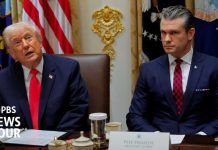
A White House decision sparks controversy, as the dismissal of CDC Director Susan Monarez ignites debate over public health and political influence.
Story Overview
- CDC Director Susan Monarez was dismissed after less than a month in office.
- Her firing follows a conflict with HHS Secretary Robert F. Kennedy Jr.
- Several top CDC officials resigned in protest, highlighting internal discord.
- The situation raises concerns about the politicization of public health.
CDC Leadership Conflict
Susan Monarez, appointed as the CDC Director in early August 2025, faced a swift dismissal by the White House after a confrontation with Health and Human Services Secretary Robert F. Kennedy Jr. This clash reportedly stemmed from disagreements over the CDC’s direction and priorities. Monarez, known for her commitment to scientific integrity, found herself at odds with Kennedy’s approaches, leading to her abrupt removal from the role.
The dismissal of Monarez was not an isolated incident. Following her ouster, several top CDC officials resigned in protest, indicating significant internal dissent. These resignations suggest a deeper rift within the agency, as many staff members aligned themselves with Monarez’s vision of scientific autonomy and resisted perceived political interference. The White House’s decision to execute this firing marks a significant shift in executive priorities, prioritizing agency reform over continuity.
Implications of Leadership Changes
The departure of Monarez and her colleagues leaves the CDC without its top leadership, posing challenges for ongoing public health initiatives. The White House and HHS are expected to announce interim leadership, but the absence of experienced officials may delay critical programs. This disruption could undermine public confidence in the CDC’s ability to respond effectively to health crises.
In the long term, the firing and subsequent resignations may erode trust in public health agencies. Such events could deter qualified professionals from seeking roles within the agency, fearing political repercussions. This incident may also set a precedent for increased political intervention in scientific agencies, a concern echoed by public health experts who warn that these actions compromise agency independence and credibility.
Political and Social Reactions
The firing of Susan Monarez has sparked a wide array of reactions. Supporters of the decision argue that leadership changes are necessary to address the agency’s “malaise,” as cited by Kennedy. However, critics view the move as an alarming example of political interference in a scientific organization. The event has reignited debates over the balance between political oversight and scientific autonomy, with many calling for clearer boundaries to protect public health policy from political agendas.
The implications of this leadership shakeup extend beyond the CDC, influencing broader discussions on the role of federal agencies in health policy. As public health becomes increasingly politicized, the need for transparent and unbiased decision-making becomes paramount to maintain public trust and ensure effective responses to future health challenges.
Sources:














